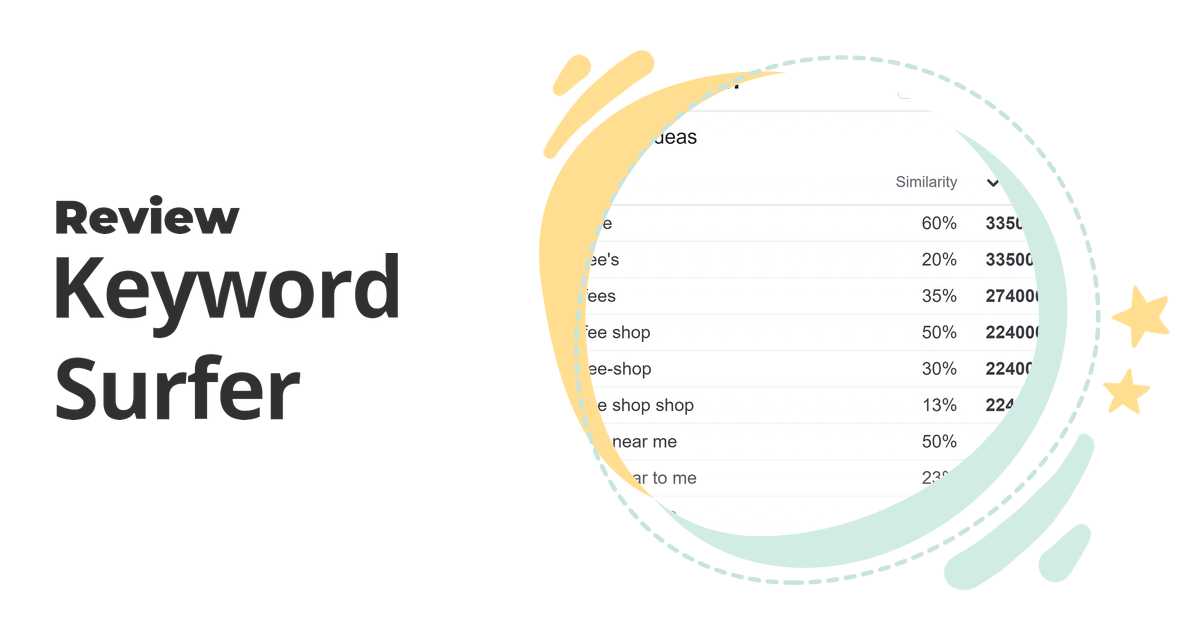
Let's face it: the world of SEO tools is quite soaked.
I'm certain as a blogger you as of now have a lot of free and paid tools available to you. For what reason would you require another device? Ahrefs or Semrush does all you require while doing SEO research… isn't that so? You can try both tool at here.

Actually Ahrefs or Semrush are just the initial segment of the situation.
Indeed you need to investigate and figure out which keywords are worth following, yet after that is settled how can you viably rank for that theme?
Surfer fills a hole in making SEO content. All things considered, SEO isn't tied in with streamlining against Google, yet contending with different bloggers. SERP leaves pieces of information on the thing Google is expecting in the indexed lists.
Already, specialized SEO reviews would require hours, if not days, to physically sort out the important query output measurements. Surfer can get you this information very quickly.
In this Surfer SEO survey, I'll separate the entirety of the elements and usefulness of the assistance. Additionally what's incredible and not very good with this assistance and provisions you can exploit, valuing, and if this instrument is eventually ideal for you.
What Is Surfer SEO and What Does It Do?
Surfer SEO is an on-page information based website improvement instrument. Surfer is as of now utilized by more than 10,000 organizations. The organization was established in 2008 by office proprietor Slawek Czajkowski in an effort to engage their SEO work with information and to save time. Surfer's activities is situated in Wroclaw, Poland.

Surfer is a tool designed to help SEO-optimize written content, like blog posts and articles.
It works by analyzing the content of a page against “500+ on-page” signals.
It also has a built-in keyword research tool.
Now, I’ll get into the features of the tool in a minute.
But the basic gist is that you write a blog post. Use Surfer to analyze the first page SERPs for your target keyword.
Then, use that info that you get to optimize your page.
The idea here is that the first page results are ranking for a reason. And you can rank too if you copy the on-page SEO approaches that your competitors are already using.
With that, let’s get into the actual features.
SERP Analyzer: Detailed Breakdown of Google’s First Page
This is Surfer SEO’s main feature.
It’s basically a VERY in-depth breakdown of the SERPs for a given keyword.

In this breakdown you get data on:
- Average word count (aka content length)
- Keyword density and frequency
- Use of partial match keywords
- Hidden content
- Page speed
- Characters count in title tags
- Alt text
And a bunch more stuff.
I’ve personally tried (and reviewed) over 200 SEO tools. So it’s fair to say I’ve seen pretty much every feature under the sun.
And yes, I HAVE seen a lot of the data you’ll find in Surfer in other tools.
But Surfer goes into much more detail. And provides some data that I haven’t seen before.
What do you do with all of this information? Should you match the number of H2s that your competition has? Or add hidden content just because it’s correlated with rankings for that keyword?
It’s pretty overwhelming.
Besides, on-page SEO is on-page SEO. There isn’t a separate Google algorithm for each keyword.
So why wouldn’t you include your target keyword in your title? Or not mention your keyword above the fold? This is stuff that you should do anyway.
Overall, I think the SERP Analyzer is pretty cool.
It has a lot of unique data points. Some of which are helpful.
But I think they should actually remove some of these data points. That way, they can help users focus on the stuff that actually matters.
Content Editor: LSI Keyword Finder
The Surfer Content Editor helps you outline and write content that’s optimized for search engines.

Specifically, it scans the content on the first page for LSI keywords. And helps you weave those into your content.
This feature also analyzes the content structure of the first page results… including word count, number of images, and average paragraph count.
Why is this a big deal?
Well, most content analysis tools scan the top 10 or 20 results. That always kind of bugged me. I’m like: “Why would I want to copy someone on the second page?”.
So I like that you can focus on the top 3, 5 or 10 results. Or even exclude one of the top ranking pages if you don’t want to include that in the analysis.
Other than that, the content editor is pretty straightforward.
You copy and paste your content into it. The tool tells you the exact LSI keywords that you need to add. And how many times to mention them.
NLP: Sentiment Analysis
Surfer SEO has a built-in natural language processing feature.
This featur allows it to auto-gather important information about your content and the words you use.
It then uses this data to help you generate the most effective, profitable keywords for your site.
The engine also analyzes the text on your pages and matches them against potential keywords that are related to what's actually being said in order to create a comprehensive list of keyword variations that will be relevant when users search for specific products or services related to what they find on your page. This is much more targeted than having Google look at what exactly you're writing about, which it does by default, and spit out whatever keywords pop up as a result of its often simplistic assumptions about wha t keywords people should be using.
Since the language code for one page is different than another, the engine includes a functionality that works with translation software to allow you to generate keywords in any of a number of languages. You can also customize what the engine recognizes as text so that it only processes English or Spanish or whatever language you happen to write in.at you're saying.e uses IBM’s Watson to find the sentiment of the search results.
At first I couldn’t get this feature to work properly.
Double-Digit Traffic Increases

Most SEOs are happy to stand around the virtual water cooler and spin yarns about their latest and greatest theory for boosting traffic to a page.
At Authority Hacker we prefer to test theories and present you with the results.
Something either works or it doesn’t – speculation doesn’t cut it around here.
This is an example of the results we achieved by upgrading a handful of our pages using nothing more than the correlational data provided by Surfer SEO and Website Auditor – correlational data is just data that is related to another piece of data. It does not prove causation.
One of the pages targeted was a blog post with an original page authority of 40 that had plateaued at 85 visits per day. In just two weeks we were able to increase page views by more than double, even from a relatively small base – around 50 visits per day:
So what did we do? And what could you be doing right now to boost your traffic? Here are some simple steps to follow:
Step 1: Find Out What Other Pages on Your Site Have Also Mastered (Part I)
Link building is all about sending qualified traffic when it matters most.
What We Like About Surfer SEO
Well the answer to this is “An awful lot”, but that’s not very precise, is it?
When we review any piece of software or service we always try to put ourselves in your shoes.
We basically ask ourselves, “What would the average person want to know about this?”
Ease Of Use
A well thought out user interface can be the difference between a tool being intuitive and a hot mess.
Complicated interfaces happen when developers focus more on providing lots of data, and not so much on providing data in a usable format.
And that’s where Surfer SEO departs from the crowd, like Jon Snow sailing away from Hard Home.
Actually analyzing a keyword, domain or URL is completely intuitive.
Content Structure Assistance
Some SEOs make the mistake of thinking that correlational SEO is only about keyword frequency for any page.
It’s not.
You have to consider the entire structure of a page, including elements like the Title and Meta Description tags, Hx tags and media.
Surfer SEO makes this type of analysis absolute child’s play.
A whole lot easier than having to manually scrape all of this data and run it through several tools to get the same result.
Surfer SEO Pricing
| Feature | Hobby | Basic | Pro | Business | Business+ |
|---|---|---|---|---|---|
| NLP (monthly) | 0 | 0 | 50 | 150 | 500 |
| SERP Analyzer (daily) | 5 | 15 | 50 | 100 | 300 |
| Content Editor (monthly) | 5 | 25 | 100 | 300 | 1,000 |
| Backlink & Visibility (daily) | 0 | 25 | 100 | 300 | 600 |
| Price | $29/mo | $59/mo | $99/mo | $199/mo | $650/mo |
If you go with monthly billing, you pay $29/month for “Hobby”, $59/month for “Basic”, $99/month for “Pro”, $199/month for “Business”, and $649/month for “Business Plus”. You save about 10% if you go for annual billing.
The features that you get access to are basically the same for each plan (with one major exception: the Hobby plan doesn’t come with page speed analysis). But you can run WAY more reports with the higher tier plans.
For example, you get 5 queries/day with Hobby. And 300 with Business Plus. That’s 60x more reports.
How does Surfer SEO’s pricing compare to similar tools?
Well, you really can’t compare a full-fledged SEO suite like Ahrefs with Surfer. Ahrefs has WAY more features.
Surfer basically ONLY does on-page SEO analysis. But it doesn’t have any features for backlink analysis, SEO site audits or rank tracking like Ahrefs has.
So I don’t think it’s fair to evaluate Surfer’s pricing based on an SEO software suite like Ahrefs. They’re two different tools.
Summary
Surfer is a new expansion to my SEO apparatus chest. Surfer permits you to perform a specialized SEO review and contrast your substance with contending destinations. You can analyze things like the quantity of words, backlinks, and keywords and expressions utilized. Surfer saves long stretches of time that recently was a manual interaction. You can find solutions very quickly, which makes it effectively worth the expense.
Pros
- Tests Many Positioning Measurements — Surfer SEO performs more than 500 positioning factors in their examination.
- Related Keyword Results — Utilizations LSI keyword examination to stop for a minute related themes, keywords and content you should add to your current article.
- Semantic Assessment — Surfer SEO utilizes AI and simulated intelligence to assess the most unmistakable words and expressions in content. Surfer utilizes Google's BERT philosophy.
- Adaptable Valuing — Month to month plans give a set number of inquiry look, so you just compensation for the cutoff your group needs.
- Saves You Time — Rather than performing a specialized review physically that would require hours to performs, Surfer saves you time inside the space of minutes have a review result to get your substance to rank.
- Program Augmentation — A Google Chrome expansion which permits you to utilize Surfer in WordPress and Google Docs.
Cons
- Overpowering For Fledglings — While Surfer SEO is not difficult to use, to get the full comprehension of Surfer you should have some inside and out information on how SEO works.
- Results Are Just An Aide — Surfer SEO results are not gospel and shouldn't be taken in a real sense. Investigation, for example, word tally, keyword utilization, or the number of pictures you need, can be irrationally high.
- Some Trivial Outcomes — Information like the quantity of headers you ought to have in a post or how much text ought to be in strong feel to some degree discretionary.
- Restricted NLP Questions — Most minimal estimated plan doesn't considerably offer NLP inquiries and next level is restricted to 50 questions each month.
- Works Just With Google — Allowed Google is 90% of the commercial center, however Surfer doesn't work with Bing, or other web crawlers like YouTube.
- Feeble Keyword Exploration Device — I don't suggest utilizing Surfer for their keyword research apparatus, however it is accessible. However certainly not Surfer's key selling point.


